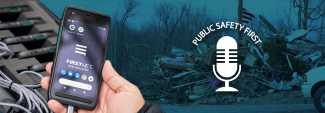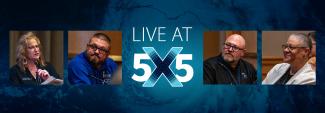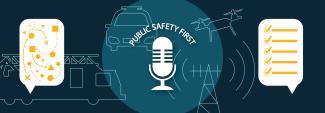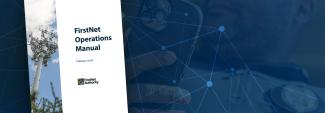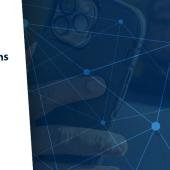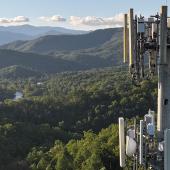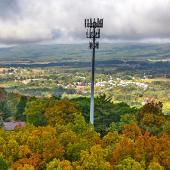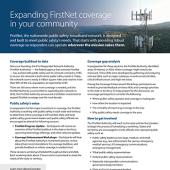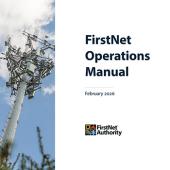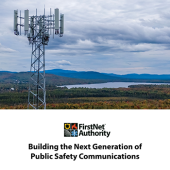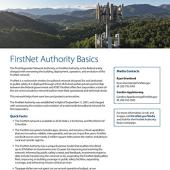Summary
Chief Erik Newman of the Stockton (CA) Fire Department shares how FirstNet played a critical role during the California wildfires in 2017.
Guest
Kevin Nida
FirstNet Authority Senior Public Safety Advisor
Chief Erik Newman
Stockton Fire Department, California
Transcript
Preview
Narrator: You’re listening to Public Safety First, a podcast to help you learn about the First Responder Network Authority and how you can be a part of the future of public safety technology.
And now, your host Dave Buchanan.
Dave Buchanan: Hello, and welcome to the Public Safety First podcast. There has been a lot of attention recently on the tragic California wildfires and the performance of communication networks for first responders. On today’s podcast, Kevin Nida—our Public Safety Advisor for California—interviews Stockton (California) Fire Chief Erik Newman.
Kevin previously had a 37-year career with the Los Angeles Fire Department where he was a Battalion Chief. Chief Newman shares his experiences with FirstNet and his use of the network during their response to the 2017 California wildfires.
Narrator: You’re listening to Public Safety First, a podcast to help you learn about the First Responder Network Authority and how you can be a part of the future of public safety technology.
And now, your host Dave Buchanan.
Dave Buchanan: Hello, and welcome to the Public Safety First podcast. There has been a lot of attention recently on the tragic California wildfires and the performance of communication networks for first responders. On today’s podcast, Kevin Nida—our Public Safety Advisor for California—interviews Stockton (California) Fire Chief Erik Newman.
Kevin previously had a 37-year career with the Los Angeles Fire Department where he was a Battalion Chief. Chief Newman shares his experiences with FirstNet and his use of the network during their response to the 2017 California wildfires.
Kevin Nida: Hi, I’m Kevin Nida. I’m the Public Safety Advisor for the FirstNet Authority in California. I’m here today with Chief Erik Newman from the Stockton Fire Department. We’re at Fire-Rescue International in Dallas, Texas.
Chief Erik Newman: Good Morning. Thank you, Kevin. And thank you FirstNet for having me on this morning.
Kevin Nida: So Chief, can you tell us a little bit about your background and your current agency?
Chief Erik Newman: Yes, I've been in the fire service approximately 28 years, working on year 29. I'm the Fire Chief currently of the City of Stockton. The City of Stockton is approximately one hour south of Sacramento. We have approximately 360,000 residents, we have 12 fire stations, and our call volume is right around about 52,000 annually.
Kevin Nida: Very good, Chief. How important is having reliable communications to you considering the area that you operate in?
Chief Erik Newman: For me and the members, having good communications is a must. We actually dispatch for five cities—the City of Tracy, Lathrop-Manteca, Manteca, and Lodi, and of course, Stockton being the fifth. And I couldn't tell you how paramount it is to have that communications. We cross boundaries, we also have the ability to go into county districts as well. And I will say that all of our agencies that we dispatch for have radios that are P25-compliant, dual-band radios and it's a must for public safety.
I remember several years ago, Kevin, we go back now dating ourselves, 20 years—you couldn't even talk to your neighbor. And now we're at a point to where you could just turn the channel, you can just jump on that other agency’s dispatch center and give your call sign and let them know that you're responding.
Kevin Nida: So, your agency has adopted FirstNet. What led you to that decision?
Chief Erik Newman: Yes, Stockton Fire Department has adopted FirstNet. About nine years ago, I was part of CalChiefs [California Fire Chiefs Association]—and I'm still part of CalChiefs—but at the time, FirstNet was formally known as “D Block.” And Jeff Johnson and several other fire chiefs and chiefs throughout the State of California took a contingency of folks back to talk about bandwidth and what D Block, now FirstNet, could do for public safety, that this would be a game changer. And I was sold back then, and it picked up steam a couple years ago, and I must say that through the presentations that FirstNet has been giving over the last year or so, it was a no-brainer for me.
The big part was just selling the city manager, you know, other deputies, and members of the Stockton Fire Department: “Hey, this is something that can definitely benefit us. It's right in line with our mission and vision as it relates to providing good service to our customers and visitors.”
To me, FirstNet wasn’t an option—it was something that we were going to do.
Kevin Nida: Earlier this year, we had some devastating fires in the state, and those fires are now continuing to … new fires starting. What was your experience earlier this year with FirstNet?
Chief Erik Newman: Well, we were early in the process of switching over to FirstNet and developing an account, and none of my members knew that we were going to be going to FirstNet. In fact, they didn't even know what FirstNet was.
But, unfortunately, there was a wildland fire in the Napa Valley/Sonoma area where we had two fire engines. So, we sent a strike team of engines to help out with immediate need, and they had some communications issues up there. Upon arrival, our [inaudible] wasn't working, our portable radios couldn't get past because the repeaters were either burned or there was some type of damage.
FirstNet showed up with some deployables; they worked with another company to set up repeaters around the area, and the captains had an opportunity to grab some phones and radios, and they were simply amazed. And when they got back they said, “Hey Chief, you know, we were at the wildland fire and we couldn’t talk, but they gave us this phone through AT&T, or a radio, and we were able to talk, and man, it was awesome. It met our needs,” and they said, “Are we going to FirstNet, too?” And I just smiled and said, “Yes, we are. Yes, we are.”
So, the beauty of that is that I didn't have to sell it. Because, now I could use those guys’ testimony to sell to the organization, based on a real-time, real-life call that they went to. And they had an opportunity to actually use the equipment that was provided to them, which was awesome. And then, the boots on the ground, they're the ones, you know, that provide the communications—they’re using the radios, they're using the phones every day. And when you get buy-in from them based on an actual event, and they give the stamp of approval—to me that's like a touchdown. So, I was just smiling. I was like, okay, well when I do my presentation for the entire department, I want to make sure I have a couple of captains and firefighters with me so they can explain and give their testimony based on the event that they had [inaudible].
Kevin Nida: Yes, [inaudible] FirstNet met your expectations—that’s what it’s all about.
Chief Erik Newman: Yes, you know, in my opinion, FirstNet is meeting my expectations, but to have a real event and have a crew that knew nothing about FirstNet and they come back and talk about, “Hey, the communications was awesome,” and what this company did and “they were able to hand out radios or portables and we were able to talk”—you can't beat that.
I see the fire service where they're going be able to auto-launch drones and send video feedback to our MDCs. Company officers, chief officers are going to be able to see, in real time, pictures of incidents, video of incidents, and really be able to make a determination on whether the resources that are being dispatched are efficient or do they need to add more resources.
And coupled with that, I think with the ability of FirstNet, not only from a radio perspective or video perspective, but also the phones—people want devices that have multiple functions. Radio, push to talk, email, phone, they don't like carrying two phones and a radio. They want something that is compact, that they can carry, that's not cumbersome, but most of all that's going to work.
Kevin Nida: How can FirstNet continue to best serve you, and best serve the fire service?
Chief Erik Newman: Well, I think that FirstNet is definitely here to stay. I believe if they can get some measurable wins by surveying the country and picking up those spots in different towns where the service is not that good, and if they could come through on building repeaters and making this system seamless, I believe that it is definitely going to improve relationships.
Speaking candid, I think some folks are a little hesitant, but I think that they're willing to give it a shot. You, FirstNet, AT&T have hired some excellent people that have good credibility, so people are willing to
take that chance. Folks like yourself that have been in the fire service for 30 plus years, we look at it from the fire chiefs that people are not going to sign on to something just to be signing on if it's not going to work. So, I believe that you're going to see fire chiefs that are willing to take that chance, like me.
How can you serve it? I think that they made a lot of promises, they need to come through on making sure that repeater sites and things are up.
Kevin Nida: The fire service obviously is a network of highly reliable organizations, and FirstNet needs to be that highly reliable organization as well.
Chief Erik Newman: Yeah, I definitely agree. You see, FirstNet is new to a lot of people. I think that when anything that comes out new, everybody's going to jump on board, but for some of us that have been around a bit, we're looking at the sustainability, you know? Where is FirstNet going to be year three, year six, year nine, year twelve, you know?
I'm hoping that it gets to a point to where I mentioned earlier. You know, I would like to see where we use video cameras on streets, satellite, drones, you know, where I can get that information back in real time to the folks that are in these fire engines, and look and see, hey—if you've got a working fire or a bad accident where they can make decisions based on what they see right then and there. Do they need to go code three? Can we go code two in the streets? So, I think that is definitely going to benefit and I'm definitely optimistic, and I definitely feel that FirstNet will be able to meet the needs of the fire chiefs and public safety just in general if they can accomplish a few of those goals as it relates to sites and things like that.
Kevin Nida: Thank you, Chief. You know, for those of us who serve in the fire service or have served, just on a personal note—what drives you to put on that uniform every day and continue to work at the work that you do?
Chief Erik Newman: Well, what drives me is as a fire chief is that I'm here to support the folks that work for me. We kind of set the tone for the day, for the organization, and I try to come to work every day with a positive attitude.
I know that I'm very fortunate and blessed to be in a position that I am, and I will tell you that the easiest thing is getting the job, believe it or not. Being a firefighter, a captain, engineer, fire chief. Once you get it, the toughest part is sustaining it. You know, you have to sustain it, and when you get it you have to do something with it. For me when I put on my uniform, I know that there was a lot of men that came before me and, you know, we are part of a legacy organization, and I try to wear it with pride, and I pride myself on doing the right thing when no one's looking.
Kevin Nida: Thank you, Chief.
Chief Erik Newman: Thank you, I appreciate it.
Kevin Nida: Enjoy your time here, in Dallas, Texas.
Chief Erik Newman: Thank you. Yeah, it's hot here, you know.
Narrator: Thanks for listening today. We're excited to have you join our podcast community. Make sure to subscribe on iTunes, SoundCloud, and YouTube. You can learn more about the First Responder Network Authority at FirstNet.gov and learn about FirstNet products and services at FirstNet.com.



